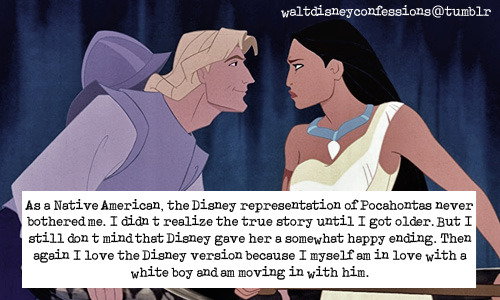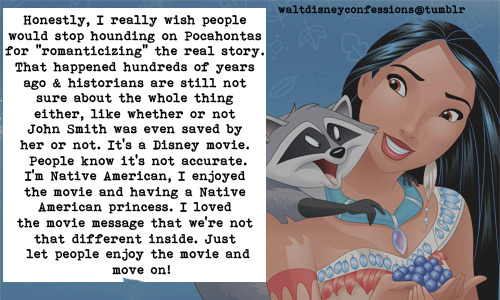I see it this way, there are people on both side of the equation. On one end people see it as something that will bring the ideals of their culture to light for new people and new generations, and on the other you have people who think we should all stay segregated and nothing should be shared among people.
Then you're viewing the issue through an erroneous, imperialist lens. Cultural exchange is not a zero sum game; inferring that those who call out appropriation and abuse of their cultural identities are somehow pro-segregation is comical on the face of it and shows you lack a clear knowledge of the historical record on this front. Segregation has been used
as a means to appropriate and exploit the land, resources and cultural networks of Indigenous people by the settler class for centuries: hence the reservation, boarding schools and California mission systems. Modern-day appropriation is just an extension of that-- a notice to Indigenous peoples that our identities are part of the colonial domain and non-Natives will always have access to them whether we like it or not.
What many people on the latter side of the fence don't realize is that, without cultural appropriation, cultures wouldn't grow. They'd stagnate and die out.
This is commonly stated but it has no basis in evidence, it's just the logical gymnastics of a settler mentality trying to invoke a heroic position against all odds: if white people hadn't come to the Americas, Natives would have never figured out how to export and expand their culture on their own! Isn't it nice how that works out.
The reality is pretty much all cultural and ethnic groupings engage in social trade-offs as a matter of course and there's a strong record of pre-colonial trade routes and intercultural mingling within Native societies. In the modern context some tribes host inter-tribal Pow Wows and will go out of their way to create venues for people from outside of their Nation (including non-Natives) to engage with the culture in a respectful manner, under the guidance of the community which is best equipped to give it voice. I've both attended and been a part of hosting similar events, so this whole narrative that there's some urgent need for white people to come take our stuff without asking or the culture will die out is farcical. Those of us who are still here have survived, literally, genocide: we are doing just fine without that, believe me.
The difference I think is how they handle it. If you're trying to exploit the culture for satire purposes or use it for profit of some kind without giving back to its people then that would be NEGATIVE appropriation. However, if your purpose is to educate, enhance, or even to admire that culture, then it would be POSITIVE appropriation.
And the only groups qualified to make that determination are the communities who are
impacted by the outcome of colonial methods of cultural extraction. There is no such thing as positive appropriation just because "you mean well"; what we need from non-Natives is for them to know better.
In the terms of Disney and Pocahontas, obviously everything was done for corporate gain. What can be done about that? Absolutely nothing. Why? Capitalism. It's all because society has been built on making profit. However, that doesn't make it any more or less wrong. It's always wrong to take advantage of anyone in any situation.
This statement is meaningless and reductive. Native people haven't been "taken advantage of," like we were swindled at a car dealership or something. Moving on, what can be done about it? Disney can end its claim to profit through cultural exploitation by retiring the
Pocahontas franchise, removing her from the Princess lineup, and issuing an apology and working with the Powhatan nation to do something different and better: maybe a story about a hero of their choosing, developed and directed by Native voices. That's just one possible idea.
Fairy Tale or not, a lot of Disney's productions are stories that come from other cultures and they have cultural influences in them based on the country of origin, yet you don't see those people up in arms about those other stories.
1) Be specific.
2) Just because you haven't taken the time to read opposing viewpoints doesn't mean they don't exist.
3) I'm guessing you aren't being specific because you know as well as I do that there isn't a mainstream Disney franchise with cultural underpinnings that
hasn't been met with resistance and criticism from people of the original culture, often if not always for good reason.
but it's all about learning from the past instead of keeping a vicious cycle that inevitably repeats itself.
Are you really doing this? Cultural appropriation is the modern symbol of that vicious cycle and is 100% rooted in racist trends of the past which is
all about white people being unwilling to let go of their perceived power and right to determination over other societies' cultural understandings of themselves. It is literally case in point.
Some Greeks were offended by the Hercules movie, yet that's okay because the West is familiar with the myths and culture? Why does familiarity make it okay? We can't play double standards.
I see your selective reading and all I can do is urge you to go back and try again before accusing people of double standards without even addressing the full substance of their argument.
Any and all culture is certainly susceptible to being mishandled, in much the same way as such material already has been. Disney has gone out of their way to see the material used in Moana is done in a respectful manner, and did a good job for the most part. They came far from when they did Pocahontas.
I mean, yeah, your life is susceptible to being mishandled if someone points a gun at you as they're in the midst of robbing your house. I guess you could frame it that way.
Should Disney just stick to exploiting the Brothers Grimm, who themselves exploited the local culture?
What exactly is your definition of exploitation.
One good, positive movie has gotten people who wouldn't normally be interested in Polynesian culture interested. You can say that people are only interested in it because it's "exotic", but that's true of any culture that isn't your own. A lot of Japanese find the American culture exotic and more interesting than their own and vice-versa for example.
Japanese culture is not threatened by abusive post-colonial policies of land and resource theft. Neither is American "culture." The Indigenous peoples of
both these countries, however, are and that's the part of the dynamic which you seem intent on not addressing.
I'd rather people take interest and learn than not at all. Even if that interest stemmed from something not perfect.
Let's be quite diddlying real for a moment:
Not a single person in this thread has gone on to learn diddly all about Native cultures or traditional Polynesian lifestyles because they saw a Disney movie (no, the Wiki article you just rushed through to try and prove me wrong doesn't count).
Stop using this excuse. It's patently false, nor would it help your case if it were true for reasons I've already outlined.
Again, like Irene, these Native Americans have a RIGHT to feel this way.
Already addressed this. Stop cycling back around to it because it's ultimately meaningless. Natives do not have the RIGHT to sign away the culture on behalf of other Natives.
Because I found it insulting. You should have the freedom to voice Pocahontas, and the choice to be happy doing so.
So just to clarify:
I've been targeted for multiple posts because some people found it "insulting" that I used a fairly innocuous term to describe someone who is literally engaged in the process of displacing the cultural identity of a people who have overtly voiced their disapproval of that process, but y'all are more concerned that I said a mean thing because I can only presume you really have your priorities straight.
This is why these conversations are pointless. You have no grounds to stand on but you continue to dig your heels into the air.
No, because then everybody is just going to be European and non-Europeans are just going to have no representation anymore. Disney really needs to hire people who are non-whites. Hiring a Maori to help Moana was a step in the right direction.
We agree that Disney needs non-white representation, or at least I would agree that in an entertainment industry which is pretty much wholly owned by the Disney franchise empire non-white representation is nevertheless critical to keeping in touch with the cultural realities of the modern era, and I would also agree that
Moana signals a Disney which is willing to engage in some course correction. What you're obviously missing is that kind of thing
only happens because of immense pressure from the impacted communities who make it clear that any other route will be unacceptable and accordingly unsuccessful. Without the strong criticism and backlashwhich ensued following
Pocahontas and some of its other films Disney would have never worked toward this kind of cultural outreach because it never would have had any awareness of the potentially negative reverberations that might occur in the absence of it. If we want to keep seeing Disney work to integrate real advances in cultural representation including the hiring of non-white film staff in leading positions, then the correct strategy is to keep the pressure on and not let Disney believe that anything is forgiven or forgotten. Especially not while it's still out there doing damage to our communities.
There's criticizing somebody for their choice aaaaaand then there's calling them a tool.
I have absolutely no idea what you're trying to get at here but I have one response:
Donald Trump is a diddlying tool.
Please, feel free to let me know how far you think you'll get defending him because he's "just doing his job." I'll wait.
my point is that there’s nothing to gain by placing blame on a woman who was sexually, physically and emotionally abused for over a decade of her life when her career and freedom of roles was one of things used against her- however my perspective is that of an outsider so thats about the extent of what i feel i could contribute to this.
I think it should be clear that Bedard's experience and process as a survivor of domestic abuse do not constitute a valid shield against the shitty things she does of her own accord; even bringing it into the conversation is really weird and loaded. Domestic violence is well known to be rampant within numerous Native communities (there's a great book,
Native American Postcolonial Psychology by Eduardo and Bonnie Duran which digs into this): in Bedard's case it appears she was married to a white man (could be wrong, don't know much about him) which is a whole dynamic of its own that certainly has important implications and speaks to bigger issues, but it doesn't in any way mean she isn't accountable for her actions or that their
impact is reduced. That's what really matters here. Bedard herself might as well be pretty much any Native actress looking for work. Of course roles for us are limited and what's available is often not good. To begin with, the system that puts Native actors and other artists in that position of powerlessness is the real problem, and it's only enhanced by the willingness of some to cooperate and loan it a veneer of legitimacy.





